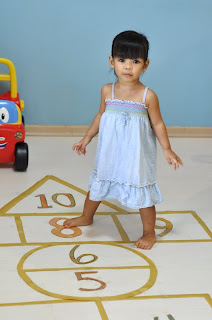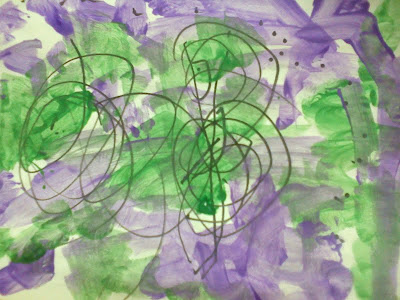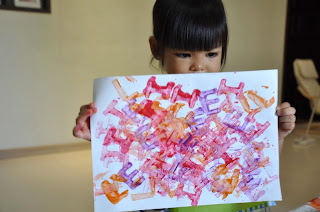 We believe that learning through play is an effective tool in our child’s intellectual development. Engaging her in these activities does not only entertain her but teaches her a lesson or two at the same time.
We believe that learning through play is an effective tool in our child’s intellectual development. Engaging her in these activities does not only entertain her but teaches her a lesson or two at the same time. Jane made this hopscotch board using pattern paper which she cut and colored (Ashrie helped in the coloring of the numbers). They then pasted it on our dining room floor using scotch tape. Although Ashrie cannot play the game technically just yet, she can be more familiar with the numerical symbols by following simple instructions like “Step on number 2, then jump to number 4!”
At the second thought, it is still hopscotch after all, because she’s hopping on the scotch tape, literally! :-)
Before I end, here is a short read from www.suite101.com about learning through play:
Play, both directed and undirected, is a critical component of learning. Play helps children learn new concepts and problem-solving skills in a natural, fun way. Through preschool play, cognitive development is nurtured and enhanced. Play also plays a large part in enhancing children’s school readiness. It is up to preschool teachers and day care providers to offer the ideas, equipment, and environment which allow children to learn and explore.
What is Cognitive Development? Cognitive development focuses on developing functions of the brain such as thinking, learning, awareness, judgment, and processing information. From the ages of 2-7, children are in the pre-operational stage. At this point they are learning to use symbols such as language to represent objects, and beginning to understand the concept of conservation. It is also the phase in which memory and imagination is developed.
Enhancing Cognitive Development through Play. Cognitive development is improved through play. Concrete learning and problem solving through play enhances higher thinking skills, according to Gale Kelleher, director of Rainbow Nursery School in New York.






















































